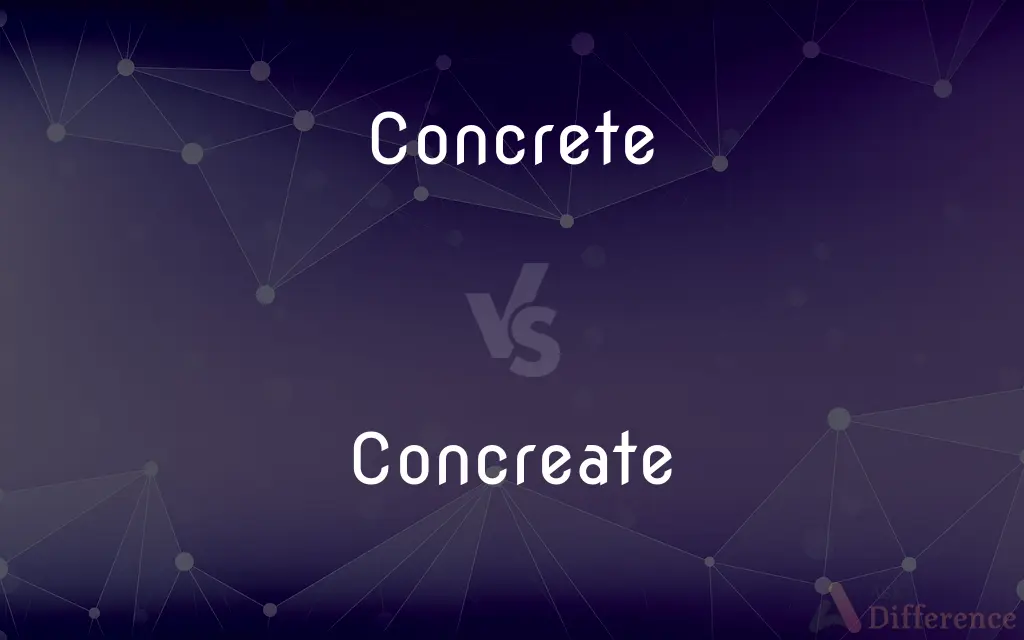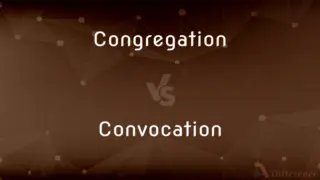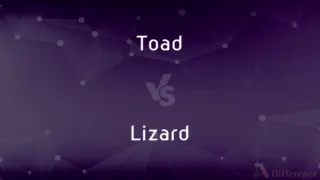Concrete vs. Concreate — What's the Difference?

Difference Between Concrete and Concreate
ADVERTISEMENT
Compare with Definitions
Concrete
Concrete is a composite material composed of fine and coarse aggregate bonded together with a fluid cement (cement paste) that hardens (cures) over time. In the past, lime based cement binders, such as lime putty, were often used but sometimes with other hydraulic cements, such as a calcium aluminate cement or with Portland cement to form Portland cement concrete (named for its visual resemblance to Portland stone).
Concreate
(transitive) To create at the same time.
Concrete
Existing in a material or physical form; not abstract
Concrete objects like stones
Concreate
To create at the same time.
If God did concreate grace with Adam.
Concrete
A building material made from a mixture of broken stone or gravel, sand, cement, and water, which can be spread or poured into moulds and forms a mass resembling stone on hardening
Slabs of concrete
Concrete blocks
ADVERTISEMENT
Concrete
Cover (an area) with concrete
The precious English countryside may soon be concreted over
Concrete
Form (something) into a mass; solidify
The juices of the plants are concreted upon the surface
Concrete
Of or relating to an actual, specific thing or instance; particular
Had the concrete evidence needed to convict.
Concrete
Relating to nouns, such as flower or rain, that denote a material or tangible object or phenomenon.
Concrete
Existing in reality or in real experience; perceptible by the senses; real
Concrete objects such as trees.
Concrete
Formed by the coalescence of separate particles or parts into one mass; solid.
Concrete
Made of hard, strong, conglomerate construction material.
Concrete
A hard, strong construction material consisting of sand, conglomerate gravel, pebbles, broken stone, or slag in a mortar or cement matrix.
Concrete
A mass formed by the coalescence of particles.
Concrete
To build, treat, or cover with hard, strong conglomerate construction material.
Concrete
To form into a mass by coalescence or cohesion of particles or parts.
Concrete
To harden; solidify.
Concrete
Real, actual, tangible.
Fuzzy videotapes and distorted sound recordings are not concrete evidence that Bigfoot exists.
Once arrested, I realized that handcuffs are concrete, even if my concept of what is legal wasn’t.
Concrete
Being or applying to actual things, not abstract qualities or categories.
Concrete
Particular, specific, rather than general.
While everyone else offered thoughts and prayers, she made a concrete proposal to help.
Concrete ideas
Concrete
United by coalescence of separate particles, or liquid, into one mass or solid.
Concrete
Made of concrete, a building material.
The office building had concrete flower boxes out front.
Concrete
(obsolete) A solid mass formed by the coalescence of separate particles; a compound substance, a concretion.
Concrete
Specifically, a building material created by mixing cement, water, and aggregate such as gravel and sand.
The road was made of concrete that had been poured in large slabs.
Concrete
(logic) A term designating both a quality and the subject in which it exists; a concrete term.
Concrete
Sugar boiled down from cane juice to a solid mass.
Concrete
(US) A dessert of frozen custard with various toppings.
Concrete
(chemistry) An extract of herbal materials that has a semi-solid consistency, especially when such materials are partly aromatic.
Concrete
To cover with or encase in concrete (building material).
I hate grass, so I concreted over my lawn.
Concrete
To solidify: to change from being abstract to being concrete (actual, real).
Concrete
To unite or coalesce into a mass or a solid body.
Concrete
United in growth; hence, formed by coalition of separate particles into one mass; united in a solid form.
The first concrete state, or consistent surface, of the chaos must be of the same figure as the last liquid state.
Concrete
Standing for an object as it exists in nature, invested with all its qualities, as distinguished from standing for an attribute of an object; - opposed to abstract.
Concrete is opposed to abstract. The names of individuals are concrete, those of classes abstract.
Concrete terms, while they express the quality, do also express, or imply, or refer to, some subject to which it belongs.
Concrete
A compound or mass formed by concretion, spontaneous union, or coalescence of separate particles of matter in one body.
To divide all concretes, minerals and others, into the same number of distinct substances.
Concrete
A mixture of gravel, pebbles, or broken stone with cement or with tar, etc., used for sidewalks, roadways, foundations, etc., and esp. for submarine structures.
Concrete
A term designating both a quality and the subject in which it exists; a concrete term.
The concretes "father" and "son" have, or might have, the abstracts "paternity" and "filiety".
Concrete
Sugar boiled down from cane juice to a solid mass.
Concrete
To unite or coalesce, as separate particles, into a mass or solid body.
Concrete
To form into a mass, as by the cohesion or coalescence of separate particles.
There are in our inferior world divers bodies that are concreted out of others.
Concrete
To cover with, or form of, concrete, as a pavement.
Concrete
A strong hard building material composed of sand and gravel and cement and water
Concrete
Cover with cement;
Concrete the walls
Concrete
Form into a solid mass; coalesce
Concrete
Capable of being perceived by the senses; not abstract or imaginary;
Concrete objects such as trees
Concrete
Formed by the coalescence of particles
Share Your Discovery

Previous Comparison
Congregation vs. Convocation
Next Comparison
Toad vs. Lizard













































